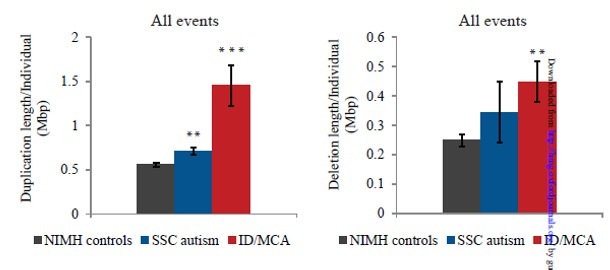More Junk Genetics Science for Autism Awareness
April 5, 2013
A study shows that children with environmentally-induced genetic changes are more likely to have regress into autism. But that has nothing to do with whether autism is inherited. That’s why such research is an utter waste of resources. This is nothing but a sideshow intended to redirect attention away from the probable real cause: vaccines.

Child as Parts Playing with Wooden Toy. Photo by epSos.de (cropped)
by Heidi Stevenson
Autism Awareness month, which is on now, brings out some of the worst junk science on the issue. The worst of all is the genetics research, which is now the beneficiary of millions of dollars, pounds, euros—pick your currency. And this time around is no different. We now have a study stating that autism is linked to changes in a region noted for genome instability.
So what? Seriously, so what? This does not help identify the cause of autism. Every bad health condition can be associated with genetics. The fact is that we’re all different, and part of that difference is our genetic basis. Our genes determine hair color, eye color, skin color, height, body type, voice range, and a huge array of characteristics that help to describe us. It also means that each of us is different in terms of inherent strengths and weaknesses—and that includes susceptibility to diseases of all types.
During an epidemic, some people exposed to the pathogen do not succumb. Why? Part of it is good health … but part of it is also innate susceptibility. That’s even more true when it comes to the modern plague of chronic disorders, including autism.
The Study
The study, “Global increases in both common and rare copy number load associated with autism”[1] found that 5-10% of autistic children have a change in a region of the genome noted for instability. That means an epigenetic, environmentally induced, change in the genome has happened.
It says absolutely nothing about what has caused the changes!
The study did not find that these changes in that part of the genome exist only in children with autism. It found these changes in children without autism, too. In fact, even when the worst autism cases are taken into account, the percentage of children with autism who have the gene is only about double those who don’t have autism. Look at these graphs to see:

These graphs display the relative number of duplication (left-hand graph) and deletion (right-hand graph) changes occurred in their study. They showed that, in terms of duplications of base pairs, the non-autistic control group (NIMH controls) were at a rate more than one-third of the most severe autism cases (ID/MCA), and only slightly below the average autism group (SSC autism). In terms of deletions of base pairs, the differences were even less.
So, what they’ve shown is only that autistic children are more likely to have an environmentally-induced genetic variation at one point in the genome—and that only 5-10% of autistic children have that kind of genetic variation in that location. So why don’t the other children with that variation also suffer? That isn’t answered.
And that’s the point. This study in no sense demonstrates that there is any genetic cause for autism. They’ve demonstrated only that changes in genetic structure known to be caused by environmental effects result in a child to be 5-10% more likely to develop autism. It says absolutely nothing about what environmental stimulus does it.
Why Do Such a Study?
Is there anything technically wrong with this study? In fact, it’s probably quite good. However, it should not have been done. The expenditure of money on a study that cannot possibly help identify the cause of autism is an utter waste of resources in an era when 1 out of 50 children is regressing into autism. It’s a travesty.
Obviously, there is no truth to the claim that vaccines have nothing to do with autism:
- It’s been acknowledged in the US vaccination court and in Italy’s court system.
- There’s a growing body of scientific evidence demonstrating a strong association between vaccines and autism.
- Strong evidence that ties the increase in autism rates to the increasing number of vaccines given to children exists.
- Modern countries with the highest child mortality rates have the highest rates of vaccinations.
- Thousands, perhaps millions, of parents attest to the evidence of seeing their children regress following vaccinations. That’s more than anecdotal, it’s a mass of evidence.
In the face of the evidence demonstrating a link between autism and vaccines, there is simply no excuse for evasion of the study that can show the truth. Simply compare the rates of autism between vaccinated and unvaccinated children.
But that’s precisely what the CDC and all other agencies that are supposedly concerned with autism flatly refuse to do. And that’s positively criminal.
Until such a study is done, there can be no proof that vaccines are innocent. Of course, the money behind vaccines is enormous, and it’s being spent to assure that nothing can get in the way of Big Pharma’s and doctor’s profits. Nothing is allowed to stand between corporate profits … including the lives of our children
Sources:
1. Global increases in both common and rare copy number load associated with autism, Human Molecular Genetics; S. Girirajan, R. L. Johnson, et al; DOI: 10.1093/hmg/ddt136
2. Relative Burden of Large CNVs on a Range of Neurodevelopmental Phenotypes, PLoS; Santhosh Girirajan, Zoran Brkanac, et al; doi:10.1371/journal.pgen.1002334
3. Autism Linked to Increased Genetic Change in Regions of Genome Stability